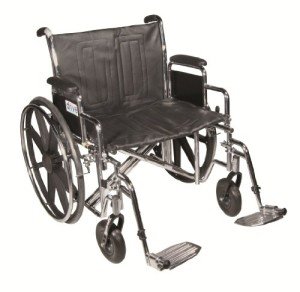Bariatric Folding Wheelchair
Bariatric folding wheelchairs are developed to accommodate users of a larger size. They feature a higher weight capacity than basic designs and are developed with reinforced products for added stability and durability.
However, not everyone with a high body mass index (BMI) needs a bariatric chair as numerous fall within the safe weight limits of standard wheelchairs.
Size and Weight Capacity
Bariatric wheelchairs have broader seats and are developed to accommodate larger people, normally weighing as much as 500 pounds. These chairs have a durable frame made from enhanced products like steel and are built with bigger wheels that provide more weight circulation and maneuverability for larger users.
When comparing bariatric wheelchairs, ensure the weight capacity is noted as static or active load. Static weight capacity describes just how much a chair can hold when it's sitting still, while active load capacity is figured out by putting the chair through a drop test that mimics somebody plopping down into the seat.
Basic wheelchairs are extensively produced and developed for users with typical body weights, making them more economical than bariatric designs. Medicare and other insurances might only cover a restricted number of bariatric wheelchairs, depending upon a client's medical needs and medical diagnosis. These chairs are likewise more expensive than basic wheelchairs due to the fact that they have a customized design and construction. However, they are a terrific option for clients with a large variety of medical conditions that need a more comfortable travel experience.
Seat Dimensions and Comfort
Unlike basic wheelchairs, bariatric models have larger seats to accommodate bigger people. They also have more robust frames and big, long lasting wheels that can hold up against higher loads. They can be personalized with different seating alternatives and devices based upon the user's requirements and preferences.
When comparing wheelchairs, it's essential to look at their weight capabilities under both static and active load scores. Fixed load refers to the chair's optimum capacity when it's sitting still, while active load steps just how much a wheelchair can securely hold when somebody sits in it and walks around. Some makers might also show the weight limit of a bariatric wheelchair in kgs, which is often more precise since it takes into account the average bodyweight of an individual who utilizes the chair.
In addition to a wide seat, a bariatric folding wheelchair needs to have adjustable cushioned leg rests to assist users stay comfortable while traveling. It must also have flip up armrests that can be moved out of the way to prevent getting in the user's way when they want to stand up or move to another surface.
If you're considering a bariatric wheelchair, ask a health care company or mobility expert for suggestions. They can evaluate your requirements, suggest the best chairs for you, and guide you through the process of buying one. They can also assist you compare features and prices to discover a wheelchair that best fits your budget plan. They can even offer advice on other mobility services such as power positioning systems and iLevel seating.
Weight and Portability
While standard wheelchairs are usually budget-friendly, bariatric chairs tend to be a bit more costly. bariatric wheel chair is due to their specialized style and building, in addition to the fact that they're a little heavier than their equivalents.

If you're concerned about the expense of a bariatric chair, talk with a health care service provider or mobility professional. They'll have the ability to evaluate your special needs and identify which kind of wheelchair is the very best fit for you. They can likewise suggest wheelchair accessories based on your specific requirements. Additionally, if you're aiming to get your wheelchair covered by insurance, such as Medi-Cal, they can assist you on the actions associated with this process. To find out more, read our guide to wheelchair insurance coverage. Then, you can begin your journey towards independent mobility.
Manoeuvrability and Handling
Choosing the best wheelchair can be an essential decision for those with restricted mobility. Bariatric wheelchairs use increased weight capacities and are designed to accommodate larger individuals. They normally feature bigger wheels, broader armrests and seating alternatives, and are stronger than basic wheelchairs.
When selecting a bariatric wheelchair, consider the individual's specific requirements and the environment in which they will be using it. Assess the weight capacity and seat measurements, and look for adjustable functions like padded raising leg rests to support convenience and ease of transfer.
Figure out whether the wheelchair appropriates for manual or powered usage. For included flexibility, a bariatric folding wheelchair can be easily folded and compressed for storage or transport. This makes them a perfect choice for those with limited home area or who require to travel fars away. The wheelchairs also include leak evidence wheels to ensure resilience and low upkeep. Appropriate for users approximately a maximum of 35 stone.
